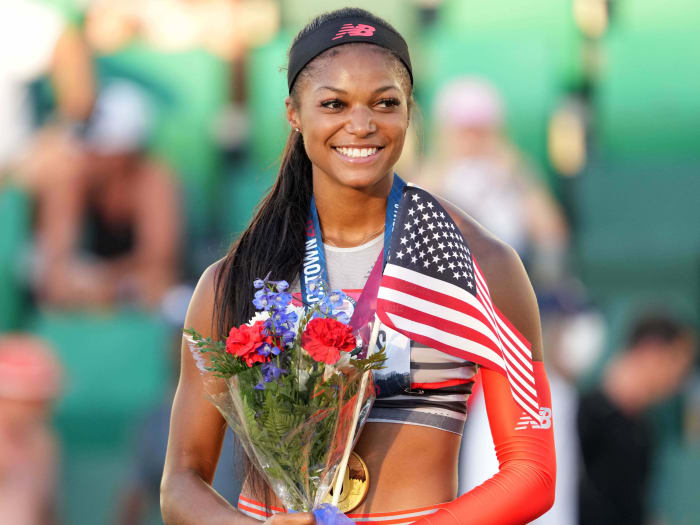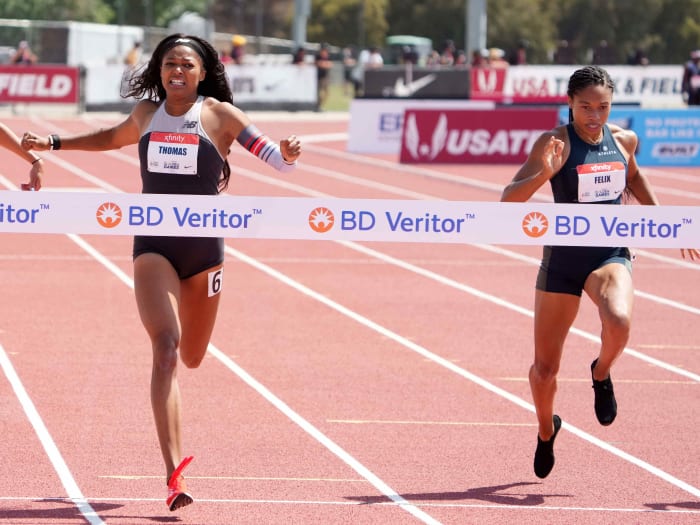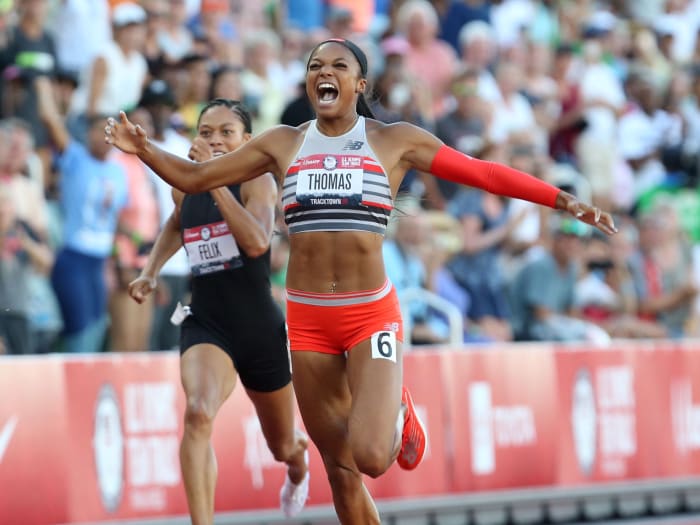List of Moves in the Field Standard Track
TOKYO — The sublime sprinter Gabby Thomas arrived at the U.S. Olympic Trials in late June carrying far more than her suitcase. There was relief, that she did not have cancer; belief, that she would win; inspiration, from an idol; a community to motivate; a sport to conquer; a platform to grow; and a world to change. Also, she needed to buy her mom a birthday gift.
Most people would consider that slate overwhelming. Thomas is not most people. She refers to this kind of overstocked docket as "Tuesday." It wasn't enough for her to simply train for the Olympics. No, she needed to train, move to Texas, enroll in graduate school, join a track club, rescue a pug, hike, master her air fryer and volunteer. Again, while training for the Olympics and waiting to hear back from doctors about a tumor on her hamstring.
Even then, she flew to Eugene, Ore., telling her best friend, "If I'm healthy, I'm going to win."
Thomas specializes in the 200-meter dash, an event once ruled by the late Florence Griffith Joyner. In her heat, Thomas set a personal best of 21.98 seconds. In her semi, she dropped that PR to 21.94. And in the final, with an Olympic bid at stake, she ran a 21.61, the third-fastest mark in the history of the event. Only the great FloJo had run faster, and only twice. Not Marion Jones, not Allyson Felix, not Gwen Torrence; icons, all. "I'm still in shock," Thomas told reporters on a Zoom call. "I cannot believe I put up that time."
Her best friend, Ngozi Musa, watched from the grandstands at historic Hayward Field. She knew everything it had taken Thomas to arrive there—the single mother striving, the skinny jeans desired, the sports shelved, the Harvard career embarked on without fanfare, the stances chosen, the Black community embraced. Musa calls simply watching this "perfect" moment, "the highlight my year."
The friends planned to celebrate afterward, but due to COVID-19 restrictions, they ended up back in Thomas's hotel room. They giggled when actor Ashton Kutcher slid into her DMs to offer congratulations. They gasped when Gabrielle Union, an actress she had long obsessed over, sent a text message. They even concocted a plan to tweet at the Jonas Brothers, her favorite band.
That same day, June 26, Dr. Jennifer Randall turned 47. When they connected, mom reminded daughter that, yeah, the history was cool and all—but what about that gift? "I'm the woman who gave you your life!" Randall teased. Oh, well. She would settle for the medal Thomas won, which she planned to display at home, in a cabinet.
At that point, Thomas, her mother and her best friend all wondered the same thing: how she could take what happened on the track and funnel it, into everything else. This was a circular endeavor, because the sublime sprinter isn't just America's most multitasking multitasker. Instead, her career, all the disparate endeavors and passions, made her a better sprinter—one now headed to the Olympics.
"We just kept talking about representation, what was possible," Musa says. "For Gabby, I call it Black girl magic."

Gabby Thomas poses with a gold medal after winning the women's 200 meters in a meet-record 21.61 during the U.S. Olympic Trials.
Kirby Lee/USA Today Sports
Thomas, her mother says, "was pretty much born athletic," a family outlier who took up soccer, karate, softball, lacrosse, golf and tennis. Even as a toddler, when Thomas scampered down a hallway, her mother says it appeared like "she was floating on air."
"Superfast," adds Randall, "even then."
Still, Randall is not that parent, the type who sees a child bumbling onto one field or another and predicts impossible athletic glory. She's realistic, pragmatic and did not view Thomas as a future professional athlete, not at first. Randall expected her daughter would become a doctor, because her brain was her greatest strength.
The mother of a future Olympian loved watching the Olympics, particularly the sprinters, like FloJo, an icon who represented Black women to the world. In 2008, transfixed by her television screen, Randall happened upon Felix, who snagged the 200-meter silver medal. Randall understands how what she says next might come across, as delusional perhaps, but she turned to her daughter, right then, and said, "You look like this person. You run like this person. You can go to the Olympics." Thomas, being 11 and all, simply rolled her eyes.
So Randall settled on a new strategy, one first deployed at the beginning of time. She would bribe Thomas, buying her a pair of brightly colored skinny jeans she desperately wanted. It felt wrong, but only a little, forcing a delay as mom wavered, promising herself she would make the purchase the next day—and then the next one. In the interim, Thomas caved, started in track, won her first race. She hasn't stopped sprinting since. But an Olympian? "I don't know if she ever thought that," Randall says.
SI Recommends
As a single mother of twins who taught social studies at a public high school, Randall wanted more for them. So she decided to model her desires, first by seeking more for herself. She went back to college, earned her Ph.D. at Emory University, joined the University of Massachusetts as a professor and moved her family to New England.
Randall enrolled her daughter in the private, prestigious and posh Williston Northampton School, where students can choose from 27 advanced placement classes, join the ski team and the official name of the institution starts with a capital T inThe. But Randall wanted Thomas to learn more than Latin. She also needed her to understand how to not only operate in traditionally "white spaces" but how to excel in them.
Because of her commitments, Thomas missed some major national track competitions. She didn't take the sport that seriously until her junior year, and when she did, she ran faster, in part because of all her other endeavors. Her mailbox began to fill with recruiting pitches. She even raced against her ideal athlete, Felix, at national team competitions.
Something about Felix, the way she carried herself, the grace she exhibited, stayed with Thomas. She had found her model, a second guide, after her mom.
On the phone from Amherst, Randall laughs. Not about Felix, or the private school. You know, she never did buy those skinny jeans. Perhaps the forgotten birthday present was … payback?

Gabby Thomas defeats Allyson Felix to win the women's 200 meters at the USATF Golden Games in May.
Kirby Lee/USA Today Sports
Thomas and Musa met at an orientation for Harvard freshmen, where they bonded as future teammates on the track team. They came to balance each other perfectly; Thomas, so cool, so collected; Musa, more of a "stormy" personality. They even ran that way. Thomas sprinted as if unbothered, forever graceful, like she could balance a textbook atop her head. Musa attacked the track in short bursts.
Kebba Tolbert coached them, having recruited Thomas after a Williston guidance counselor tipped him off. In Thomas, he saw a runner who was raw, brilliant and competitive—good ingredients for a coach who needed to recruit fast people who were also smart.
Asked whether he could see all this coming, though, and Tolbert answers honestly. "Yes and no," he says. He did tell Thomas that she could become an NCAA champion, but even that goal he considered lofty. Had anyone wondered then whether he believed Thomas would grow into one of the world's three fastest women, he would have said, "That's kind of a stretch." Of her times in high school, he says, "there are thousands of kids that do that."
There are not, however, thousands of kids like Thomas. He knew that, too. She majored in neurobiology and global health, hoping to become an epidemiologist. Her studies fascinated Thomas, like one on the Tuskegee experiment, where almost 400 Black men were told by the U.S. government they were being treated for syphilis for free, when, really, the disease was being allowed to spread so the effects could be studied. She learned that in a freshman seminar, "Sick and Tired of Being Sick and Tired: Health Disparities and African Americans."
Thomas called her mother, expressing the anger that bubbled inside in those classrooms, another traditionally white space. "You should be angry," Randall responded, before issuing a challenge. Use it.
That education—lessons on inequity in health care, papers on how the media framed the crack academic—broadened Thomas's worldview. Channeling her fury gave her purpose. "This is a serious person," Tolbert says.
At first, Thomas ran track, essentially, on the side. This combination of factors—late and light recruitment, packed schedule, missed meets—meant that Thomas was, Musa says, "always underestimated." She worked with Tolbert on everything from technical proficiency to mental focus, the incubator competitive, which helped Thomas, because that was her ethos. She also hadn't trained year-round before. By the end of her first season, she managed a third-place finish at the NCAA championships, then went out and placed sixth at the Olympic trials.
Even then, track would not define Thomas. Even if she wins gold, seizing the world's attention, landing on a Wheaties box, it never will. She considered quitting the sport, lessening her obligations. At NCAAs her sophomore year, she again finished third, despite her growing discontentment. Her mother referred to all the stress that built as the overwhelm, but reminded Thomas that school mattered more than sports.
Her daughter took up meditation, tried to sleep more, even took the occasional break to paint her nails or slide into an Epsom salt bath. When that wasn't enough, she asked Tolbert whether she could study for a semester in Senegal. There, she saw people with little money who were happy and connected, and this in turn made her feel light.
She came back with a new balance, realizing that not only could she handle eight million pursuits, but by doing each one well, she would be better at all of them. If that seems counterintuitive, well, Thomas set the indoor collegiate record in the 200 meters, becoming the first NCAA sprint champ in the history of the Ivy League. She never stopped winning after that, collecting 22 Ivy titles in six different events and setting university records every other month.
Her focus shifted yet again, right then. She wouldn't stop anything; she would add to her plate, which now resembled something a competitive eater might down in competitions. She told her mom that she wanted to run professionally, and they began to map out what that life might look like. Randall, meanwhile, never stopped reminding her daughter of their larger goal. "What are you going to do after? What are you going to do for Black women?"
Thomas did turn pro but finished her degree. She signed, fittingly, with New Balance.

Gabby Thomas wins the women's 200 meters during the U.S. Olympic Track and Field Trials.
Chris Pietsch/USA Today Network
To the list of things that are bigger in Texas, Thomas, upon moving there, added her own dreams. While her mother studied the impact of standardized assessments on historically marginalized populations, her daughter shifted from the lab toward policy, deciding to examine public health at Texas in between training sessions for the Games.
She also joined The Buford Bailey Track Club, seeking inspiration and guidance from Black women who had won gold medals. This further empowered Thomas in now-related pursuits, crystallizing how she wanted to change the world—by addressing the inequalities in health care made painfully obvious by the pandemic—and, through track success, giving her the means to change it beyond her grandest expectations.
As the trials approached, Thomas was forced to confront a health scare of her own. She went in for tests on her hamstring back in May, which led to an MRI on her lower back, where doctors found a tumor in her liver. The word they used—cancer—terrified her. Throughout, Thomas never showed her deep concern in public, but Randall worried the stress would manifest elsewhere, perhaps even in track. Fortunately, the tumor was benign and would not require surgery. When her mother heard that news, she had an out-of-body experience, like an extreme version of relief. Her daughter could, indeed, compete.
Then, the trials, the race against Felix that felt to Thomas like an "honor," the time, the FloJo history, the way her idol, a nine-time gold medalist, embraced her at the end. Randall, the mother who had almost bribed her daughter into track, who considered FloJo an ideal, could hardly make sense of everything. She uses words like stunned and amazed, even while track insiders wondered if Thomas could have topped the world record, had she not raised both arms in victory for her final five strides. Asked if one day she might topple FloJo anyway, Thomas told reporters she had "blacked out" and didn't remember the race. But, she continued, of course, she could. "I don't want to put limits on myself," she said.
Why would she? Griffith Joyner's husband, Al Joyner, watched Thomas sprint toward history, then watched Elaine Thompson-Herah better his wife's Olympic record in Tokyo on Saturday night. He now sees the sea change he long expected, with female sprinters pushing further, going faster, in a way he believes his late wife would appreciate. He wonders whether Thompson-Herah will stoke Thomas's competitive nature when the 200-meter final is held Tuesday here. He's rooting both for Thomas—"she's ready to be on a different level now," he says—and the byproduct of her success, the way she will remind the world of FloJo and her legacy.
Speaking of, Thomas continues to build a legacy of her own. A student from Harvard last won an Olympic gold medal in 1896, except that triple-jumper James Connolly never finished his degree, meaning Thomas would become the first-ever graduate to win.
Should that happen, she can expect more celebrity endorsements, broader fame and a wider platform. Then the Olympian who only saw herself that way recently will use track not as an end goal, but as a starting one, to speak out against injustice, to show that a Black sprinter can thrive in mostly traditionally white spaces and a traditionally Black sport. "She's doing exactly what she should be doing," says her mother, who remains floored that another woman, in another living room, might watch her daughter at the Olympics and see in Thomas what she herself saw in Felix all those years ago.
Sometimes, late at night in the Harvard days, Musa and Thomas would map out their futures. They formulated plans to show grace in a way that "holds people accountable," Musa says, "because then, they might hear us." Musa ended up turning those conversations into a podcast, Aesthetics & Athletics, her goal being to empower women in sports. She recently had on a famous—and familiar—guest.
In Tokyo, Thomas can medal twice, in the 200 and the 4X100 relay. Her mother will watch from Massachusetts, her best friend from Seattle. Both will see more than an athlete and more than a brilliant student. They'll see both in one person, each pursuit bolstered by the other, the busyness not a distraction, or a burden, but fuel to be fast.
More Olympics Coverage:
• Katie Ledecky Isn't Done Yet
• Mykayla Skinner Wins Unexpected Silver on Vault
• U.S. Swimming Dominates at Olympics
• Mixed Events Are Perfect for the Olympics. More Sports Need to Get In on It
List of Moves in the Field Standard Track
Source: https://www.si.com/olympic-track-field/2021/08/02/gabby-thomas-200-meter-dash-sprinter-new-standard-harvard